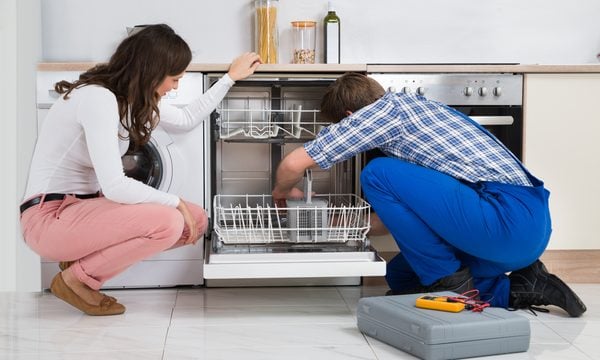Home Warranty vs. Home Insurance: What’s the Difference?
Home warranties and homeowners insurance cover different types of problems.

Some or all of the mortgage lenders featured on our site are advertising partners of NerdWallet, but this does not influence our evaluations, lender star ratings or the order in which lenders are listed on the page. Our opinions are our own. Here is a list of our partners.
Nerdy takeaways
- Both home warranties and homeowners insurance can help pay to repair or replace appliances and household systems, but they apply in different situations.
- A home warranty covers wear and tear, while home insurance pays for issues caused by things such as fire or storms.
- Depending on your location, homeowners insurance can be much more expensive than a home warranty.
The main differences between a home warranty and home insurance is what they cover and when their coverage applies. Both pay to fix appliances or major home systems but in different scenarios.
Here’s what you need to know about how home warranties and homeowners insurance differ.
The basics
Your mortgage lender probably requires that you have homeowners insurance, but a home warranty is optional. You can have both types of coverage.
How a home warranty works
A home warranty is a service contract for major appliances and household systems when they break down because of everyday use. If your water heater stops working or your air conditioning unit isn’t running properly, a home warranty might pay for a technician to fix the problem. It may also supply a replacement if the appliance is beyond repair.
🤓 Nerdy Tip
Home warranties aren’t a type of insurance, even though some home warranty companies say you’ll pay a deductible with each claim. They’re service agreements — a contract for service in certain situations — and home warranty companies aren’t always regulated in the same way as insurance companies. How homeowners insurance works
Homeowners insurance has a broader scope. It covers appliances, household systems and everything else in your house. This includes all of your belongings and the structure of the building. Home insurance also covers detached structures, such as sheds or fences.
Unlike a home warranty, home insurance pays for damage from sudden, unexpected events like fires, windstorms and break-ins. Homeowners insurance policies specifically exclude problems due to wear and tear.
Advertisement
What they cover
Depending on the plan, home warranties can cover appliances, systems or both. Home insurance generally covers more items and structures because it’s meant to protect the entire house, not just appliances and systems.
| Item | Home warranty | Home insurance |
|---|---|---|
| Built-in appliances | Yes. | Yes. |
| Major home systems (like A/C) | Yes. | Yes. |
| Pools | Yes. | Yes. |
| Primary house structure | Only certain areas if damaged during repair. | Yes. |
| Secondary structures | Sometimes, if you purchase additional coverage. | Yes. |
| Electronics (such as computers or TVs) | Depends on the plan. | Yes. |
| Home warranty coverage listed in this table is for normal wear and tear. Coverage listed in this table for home insurance is for situations specified in a homeowners insurance policy, such as a fire. | ||
» READ MORE: Compare home warranty coverage and homeowners insurance coverage.
When they cover something
Home warranties and home insurance policies apply coverage in different situations.
When a home warranty applies
Home warranties usually only cover issues related to everyday wear and tear. They do not cover problems related to improper installation or improper maintenance.
When homeowners insurance applies
Home insurance usually kicks in only when certain types of events happen. Examples include:
- An appliance or system causing structural damage. For example, if your dishwasher springs a leak and floods your kitchen, your home insurance policy is likely to pay to repair the water damage — but not the dishwasher.
- Theft. If someone breaks into your home, your policy will likely pay to repair any related damage and to replace any stolen items, depending on your policy.
- A natural disaster. Weather events such as wildfires and hail are often covered by homeowners insurance.
Even though a homeowner insurance policy will cover your property when some disasters occur, it rarely covers your home for damage caused by floods, earthquakes or high-wind events such as hurricanes. These usually require additional policies to protect your house, so ask your home insurance provider about coverage for these events.
» MORE: Are home warranties worth it?
How long until they kick in
Most home warranty plans require customers to wait 30 days before they’ll pay for a repair. This helps prevent fraud by keeping people from signing up to fix a problem that just happened.
Homeowners insurance policies usually take effect more quickly.
How much they cost
For both home warranties and homeowners insurance, the more coverage you choose, the higher the cost.
Cost of a home warranty
A home warranty costs an average of $747 per year in 2025 but can be more than $1,400 annually with some plans.
Home warranties usually charge a service fee that you’ll pay each time a technician comes to your house, even if your warranty doesn't cover the resulting repairs.
Cost of homeowners insurance
Homeowners insurance, on the other hand, can be as low as $610 to more than $6,000 annually, according to NerdWallet's analysis.
Most homeowners policies have a deductible, which is the amount you have to pay before your insurer will cover your claim. Fore example, maybe a storm knocks out your air-conditioning unit and it needs $2,100 worth of repairs. With a $1,000 deductible, your policy would cover $1,100 after you pay $1,000 out-of-pocket.
» CALCULATOR: Estimate your home insurance cost
Possible added costs
You might also have to pay more toward a repair than just your service fee or deductible in some scenarios, such as:
- The problem is caused by something that your contract or policy doesn’t cover.
- The cost to repair the damage or replace the item is above your coverage limit.
- You choose to buy a higher-end replacement appliance than what you had before or what the provider is willing to purchase.
How claims work
If you need your home warranty company or homeowners insurance company to help with a problem, you’ll have to reach out to them directly to submit your claim.
Making a home warranty claim
The major difference from homeowners insurance is that home warranties usually require you to pay a service fee before a technician will check out your problem. Because you pay this in advance, you’re out this money even if the home warranty company denies your claim.
Making a home insurance claim
On the other hand, home insurance policies only make you pay your deductible if your claim is approved.
Both types of coverage will send out a professional to evaluate the claim — a technician for a home warranty and an adjuster for insurance. Some home warranty companies will let you choose your technician in certain situations, but most insurance adjusters are chosen by the insurance provider. In some cases, you can hire a public adjuster to dispute a denied homeowners insurance claim, but doing so usually costs extra money.
Advertisement
NerdWallet writer Sarah Schlichter contributed to this article.
Article sources
NerdWallet writers are subject matter authorities who use primary,
trustworthy sources to inform their work, including peer-reviewed
studies, government websites, academic research and interviews with
industry experts. All content is fact-checked for accuracy, timeliness
and relevance. You can learn more about NerdWallet's high
standards for journalism by reading our
editorial guidelines.
More like this
Related articles
AD
50% OFF Select Plans — Limited Time Only
Call American Home Shield
REDEEM NOW
on American Home Shield's website
AD
50% OFF Select Plans — Limited Time Only
- Comprehensive Coverage from Just $29.99/Month;
- Trusted by Over 2 Million Members for 50+ Years;
- No Records or Home Inspections Required.
Call American Home Shield

REDEEM NOW
on American Home Shield's website
AD
Protect Your Home for as little as $1 / Day
Call Select Home Warranty
REDEEM NOW
on Select Home Warranty's website
AD
Protect Your Home for as little as $1 / Day
- Great Home Warranty Protection with $150 off + 2 Months Free + Free Roof Coverage;
- Join the Select Benefits Program and Save up to 75% on Common Everyday purchases.
Call Select Home Warranty

REDEEM NOW
on Select Home Warranty's website






